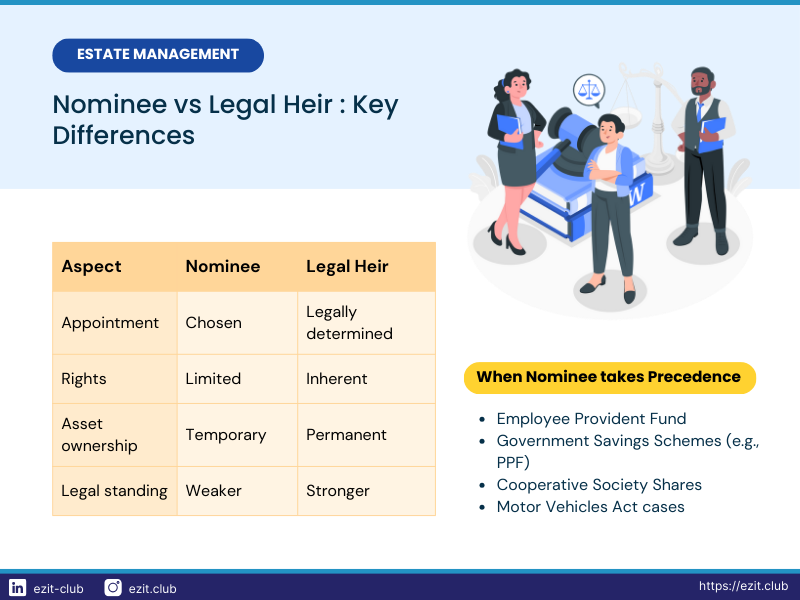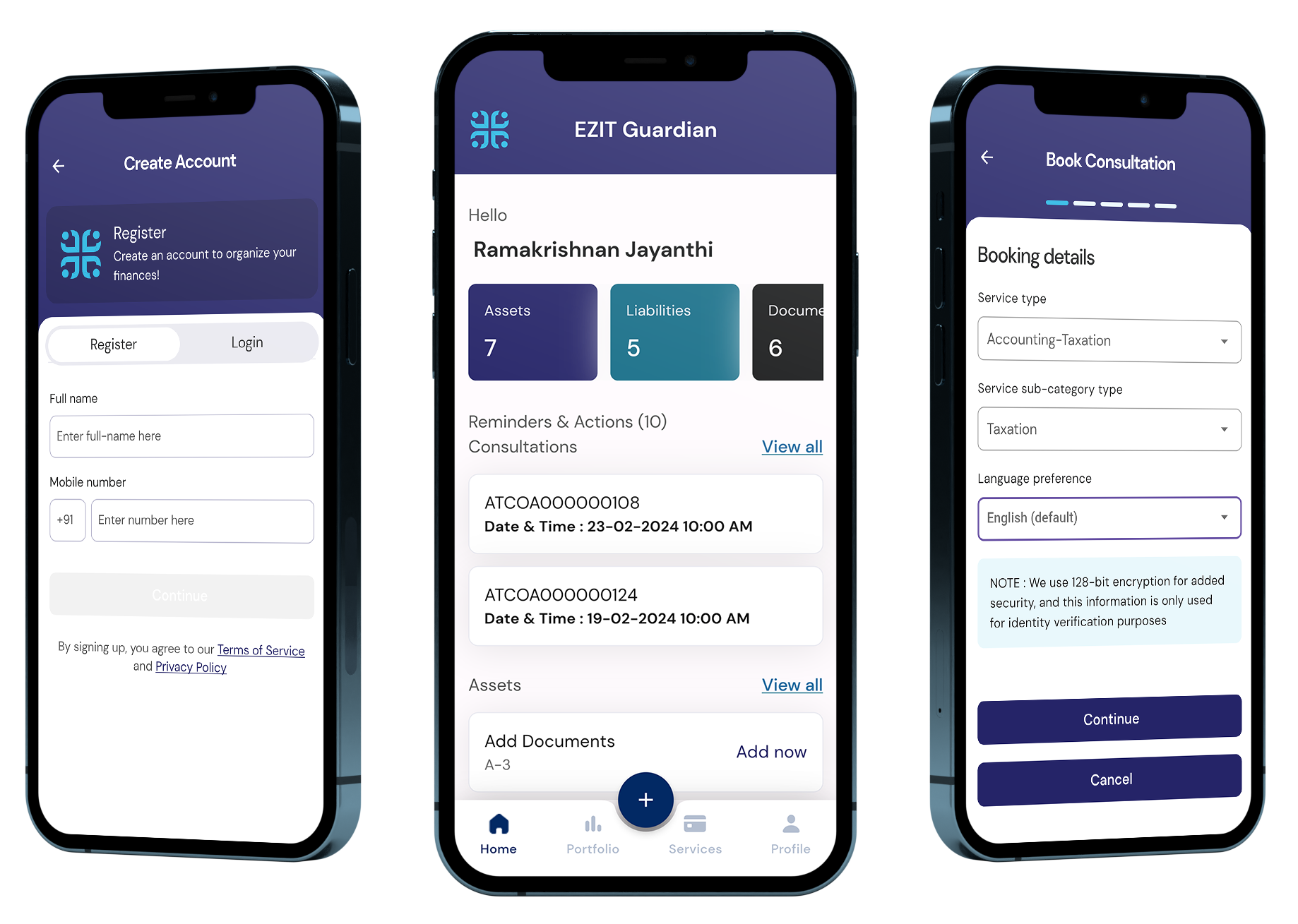TL;DR
In India, a nominee is a custodian of assets, while a legal heir has inherent rights to the deceased’s property. Nominees are appointed by the account holder, while legal heirs are determined by succession laws. The distinction between nominee and legal heir is crucial for proper estate planning and avoiding inheritance disputes. In certain situations, such as specific financial instruments or in the absence of a will, the roles and rights of nominees and legal heirs can vary.
Introduction
In Indian financial and legal contexts, the terms ‘nominee’ and ‘legal heir’ often cause confusion, leading to potential conflicts in inheritance matters. These roles have distinct meanings and implications, especially concerning asset transfer after an individual’s demise. This comprehensive guide aims to clarify the nominee vs legal heir differences in India, helping you understand their respective roles, rights, and legal standing in various scenarios.
Understanding Nominees in India
A nominee is an individual designated by an account holder or policy owner to receive the proceeds or manage the assets in the event of the holder’s demise. Key points about nominees in India include:
- Appointment: Nominees are appointed by the account holder or policy owner.
- Role: They act as custodians of the assets until they are distributed to legal heirs.
- Legal Standing: Nominees don’t automatically have a right to the assets; they are mere trustees.
- Types of Assets: Nominations can be made for bank accounts, insurance policies, mutual funds, and more.
Understanding Legal Heirs in India
Legal heirs are individuals who are entitled to inherit the deceased’s property by law. Important aspects of legal heirs in India include:
- Determination: Legal heirs are determined by succession laws, which vary based on religion in India.
- Rights: They have inherent rights to the deceased’s property.
- Legal Standing: Legal heirs can claim their share of the property, even if they’re not nominated.
- Succession Laws: For Hindus, Buddhists, Sikhs, and Jains, the Hindu Succession Act, 1956 applies. For others, the Indian Succession Act, 1925 is applicable.
Key Differences: Nominee vs Legal Heir in India
Understanding the nominee vs legal heir differences is crucial for proper estate planning:
| Category | Nominee | Legal Heir |
|---|---|---|
| Appointment vs Inheritance | Appointed by the account holder | Determined by succession laws |
| Role and Responsibility | Acts as a trustee or caretaker of assets | Has the right to inherit and own the assets |
| Legal Standing | Limited legal right to the assets | Strong legal claim to the deceased’s property |
| Distribution of Assets | Must distribute assets to legal heirs | Can claim their share of the assets |
| Dispute Resolution | May face challenges from legal heirs | Can contest asset distribution in court |
Exceptions to the Rule: When Nominees Take Precedence
While legal heirs generally have stronger rights, there are specific situations where nominees may receive assets directly:
- Employee Provident Fund: The nominee receives the EPF amount directly and is considered the beneficial owner.
- Government Savings Schemes: In schemes like Public Provident Fund (PPF), the nominee becomes the owner of the account.
- Cooperative Society Shares: Nominees of shares in a cooperative society become owners upon the member’s death.
- Motor Vehicles Act: The nominee of a transport vehicle can transfer ownership to themselves.
In these cases, the nominee’s right is stronger due to specific provisions in the governing laws or regulations.
Intestate Succession: Asset Distribution Without a Will
When an account owner dies without making a will (intestate), the distribution of assets follows the applicable succession laws:
- For Hindus, Buddhists, Sikhs, and Jains: The Hindu Succession Act, 1956 applies.
- Class I heirs (spouse, children, mother) inherit equally.
- If no Class I heirs, then Class II heirs inherit.
- For Muslims: Islamic law applies, with variations based on sect.
- Generally, male heirs receive twice the share of female heirs in the same degree of relation.
- For Christians and Parsis: The Indian Succession Act, 1925 applies.
- Specific rules determine the order and proportion of inheritance.
In all cases, nominees still act as trustees and must transfer assets to the legal heirs as determined by these laws.
Navigating Dual Appointments: Nominee and Legal Heir for the Same Asset
In cases where an account holder appoints a nominee who is also a legal heir, such as for a fixed deposit:
- Immediate Access: The nominee gets immediate access to the funds for practical purposes.
- Legal Obligation: However, they are legally obligated to distribute the funds among all legal heirs.
- Proportion of Distribution: The distribution should be as per the will, if one exists, or according to succession laws if there’s no will.
- Potential Disputes: Other legal heirs can contest if they believe the nominee is not distributing the assets fairly.
- Bank’s Role: Banks typically release funds to the nominee but may require an indemnity bond to protect against future claims from other legal heirs.
This scenario emphasizes the importance of clear communication and proper estate planning to prevent conflicts among family members.
Implications for Estate Planning in India
Understanding the nominee vs legal heir differences has significant implications for estate planning in India:
- Comprehensive Will: Creating a will is crucial to ensure your assets are distributed according to your wishes.
- Informed Nominations: While making nominations, inform the nominee about their role as a trustee.
- Communication: Inform your legal heirs about your nominations to prevent future disputes.
- Regular Updates: Review and update your nominations and will periodically.
- Professional Advice: Consult with legal and financial experts for proper estate planning.
Common Misconceptions: Nominee vs Legal Heir
Several misconceptions exist regarding the nominee vs legal heir debate in India:
- Misconception: Nominees automatically inherit the assets.
Reality: Nominees are custodians and must transfer assets to legal heirs in most cases. - Misconception: Nomination overrides a will.
Reality: A valid will takes precedence over nomination in asset distribution. - Misconception: All assets require nomination.
Reality: While beneficial, nomination isn’t mandatory for all asset types. - Misconception: Legal heirs have no claim if a nominee is appointed.
Reality: Legal heirs can claim their share regardless of nomination in most cases.
Conclusion
Understanding the nominee vs legal heir differences in India is crucial for effective estate planning and preventing inheritance disputes. While nominees play an important role in immediate asset management after a person’s demise, legal heirs generally have stronger rights to inheritance under Indian law. However, exceptions exist for certain financial instruments and specific scenarios.
Key takeaways:
- Nominees are usually appointed custodians; legal heirs have inherent rights to property
- Nomination doesn’t override the rights of legal heirs in most cases
- Specific financial instruments may give nominees stronger rights
- A comprehensive will is essential for clear asset distribution
- Regular review and update of nominations and wills is important
- Professional advice can help navigate the complexities of estate planning in India
By understanding these distinctions and various scenarios, you can make informed decisions about your estate, ensuring your assets are managed and distributed according to your wishes while minimizing the potential for family disputes.
How EZIT Guardian Can Assist
Navigating the complexities of nominee appointment and estate planning can be challenging. EZIT Guardian offers comprehensive support to ensure your assets are protected and your wishes are honored.
EZIT Guardian can help in:
- Estate Planning Consultation: Understand the nominee vs legal heir implications for your specific situation.
- Will Creation and Registration: Develop a comprehensive will that clearly outlines your asset distribution wishes.
- Nomination Review: Ensure your nominations align with your overall estate plan.
- Legal Guidance: Get expert advice on Indian succession laws and their impact on your estate.
- Document Management: Securely store and manage your important legal and financial documents.
Don’t leave your legacy to chance. Contact EZIT Guardian today to create a robust estate plan that protects your assets and provides clarity for your nominees and legal heirs. Download the EZIT Guardian app from the Google Play Store & App Store today to schedule a consultation and take the first step towards securing your legacy.


